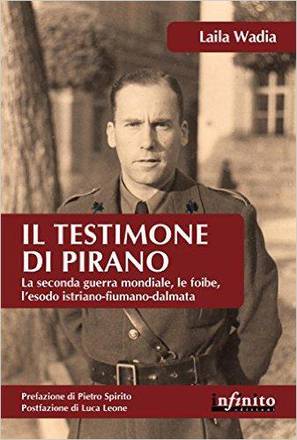Books: sinkholes, Istria, and war told by Indian writer
Laila Wadia engaged in a difficult but exciting story
15 April, 15:40by Francesco de Filippo
(ANSA) - TRIESTE, APR 15 - Laila Wadia, THE PIRAN WITNESS. THE SECOND WORLD WAR, SINKHOLES (FOIBE), EXODUS FROM FIUME-ISTRIA-DALMATIA- (Infinity editions; 109 p .; 13 euro).
It's quite difficult to figure out why an Indian writer who's been living in Trieste for years decides to write a story about a man involved in the controversial events of Italy's North-East, and to cope with very difficult issues such as minorities, communists, sinkholes, partisans. A subject which is hard to deal with even for experts. When you ask her why she decided to face this challenge, Laila Wadia candidly answers: ''Because looking into Mario Valente's story I was able to find a metaphor for all wars and all migrations''. That's why she wrote ''The Piran Witness'' (Infinity editions), a novel based in the beautiful Istrian town, which once belonged to Italy, and now to Slovenia, about 30 minutes by car from Trieste, where the main character was born. Wadia points out: ''I know what it means to flee your homeland, I belong to a small ethnic group that fled Zoroastrian Persia and sheltered in India. Besides, this is a novel, and a love story''. Mario, born in 1902, was her father in law and, being a refugee in Trieste, told her a lot of stories and anecdotes. Starting with his childhood, which was very hard: Mario's father died in WW2 and he, along with his mother and three sisters, has survived without food for many days. Then some fishermen happened to have so much fish that they accept even Mario's (who was a child) help to pull nets onto the boat. In return, the kid is allowed to take as much fish as he can; that's why he fills the elastic suit he wore until he looked like the ''Michelin Man''. Even though he comes home wounded by fish bites, his family will have something to eat for some days. Mario (who became a fireman) experencies two world wars and the ferocious postwar period. Anyway, the Nazis and the Fascists, violence, deaths, allies, Tito in Trieste for 43 days, 300,000 refugees displaced from Istria to Italy: all these events take place in the background. The small town of Piran, located between a the cobalt blue sea and the Mogoron Mountain, happens to be on this side of the border one day and on the other side the day after. This changing geography seems to have no consequences until the B area was taken over by Yugoslav forces. The Ozna, Tito's secret police, became too 'diligent', causing the 'disappearance' of many Italians. Mario, was no longer the same after recovering 84 corpses from Vines sinkhole; his wife Anna succeeds in convincing him to leave his beloved Istria and go to Trieste. Where, after so many years of sorrow and suffering, the family is finally able to settle down.
(ANSA).














